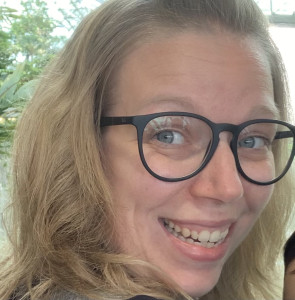In a veterinary career that has taken her all over the world, Laura Craighead has overcome many challenges, not least those posed by her dyslexia. Mum-of-two Laura, Principal Vet at Vets Now Salisbury, tells of the path she’s taken and the welcome change in attitudes as she reflects on this year’s Neurodiversity Celebration Week.
How did your dyslexia impact your early life?
I didn’t get an official diagnosis until 10 years ago, so it was something I lived with without ever having a medical explanation. I’m the youngest of three girls and my mum noticed quite a big difference in my schoolwork, struggling with spelling, writing letters backwards. My sisters read books for pleasure, but I found that really difficult. I know my mum did speak to my primary school, but it was just dismissed. I think that was the same for most people of my generation, especially girls, although there is much more awareness now. At secondary school I was very maths and physics orientated, but English and anything that involved a lot of writing was very hard. One of my sisters went to vet school and the other to medical school. I think my parents just thought I was going to be more creative, and they’d support me with whatever I wanted to do. But I surprised everyone – including myself – by getting good exam results and successfully applying to vet school.
How was that experience and how did your career progress?
I went to Glasgow University, qualifying in 2007. Prior to going, the thought of all the studying was just too much and I did have to repeat a few exams. But because it’s quite a small vet school, I loved the environment. The prospect of then going out into practice and not having that community around me was terrifying, so I went to volunteer with an equine charity in the Gambia. I had a lightbulb moment there when I saw the research they did. I came back and did a couple of years small animal practice and had a taste of weekend cover at Vets Now in Sheffield, which I really enjoyed. I also became involved with charity Worldwide Veterinary Service which led to a lot of travelling to charities in many different countries, while still doing out-of-hours shifts back here.

What led to your eventual diagnosis?
When I went back to the RVC to do a Masters in Veterinary Epidemiology as part of my research interests, one of the support staff at the induction went through a potential dyslexia checklist. I said yes to pretty much every single one. They went on to pay for my diagnosis process and then put things in place to support me.
How did you feel about actually having a diagnosis after all that time?
I struggled a bit. Part of me felt like I was labelled and that knowing it officially might make it a barrier. And while I wouldn’t class myself as having a disability, there is still that tick box on forms. Going into a new job, for instance, I think many people don’t disclose their neurodiversity in case employers view it negatively. But I’ve come to understand how I work and some of the difficulties I’ve faced.
Tell us how you came to your current role at Vets Now?
I’d been doing loads of locum shifts at weekends and after having my first baby in 2018, I did the AdvantEdge course the following year. After what was going to be a part-time role at the Salisbury clinic, I took on the PV role. I then finished my PhD, had another baby and I’m loving what I do here now.
How have you found the support with your neurodiversity at Vets Now?
I didn’t feel I needed to reach out for too much in my PV role, but it’s really heartening to see the level of interest in the company in how to support neurodiversity in the workplace. I feel there is a lot of momentum and I’ve had some really good chats with people. Everyone is different and there’s not a one-size-fits-all solution, so it’s about being open to having conversations about what may be put in place.
I think a lot of people with a neurodiversity are drawn to Vets Now because of the smaller team structure. Many find that easier than being in a big team in a daytime practice. Some of those in groups I’m on who say they are really struggling are recommended to try OOH, and I think we probably have a higher proportion of people with neurodiversity than general practice.
Do you feel being a vet with a neurodiversity is easier in 2023?
Definitely. I think we are on the cusp of really going in the right direction. There is a very welcome momentum building.
Finally, is there generally more help out there?
There’s a lot more awareness and support. I follow a platform called Made by Dyslexia who have put together really good, free training for teachers to help them spot dyslexia. They have also commissioned studies into what workforce skills are needed. The way dyslexics think mean they have exactly the skills that will be needed in the future, while more neurotypical skills are the ones more compatible with being automated. So, there is very much a big role for all those who are neurospicy!
